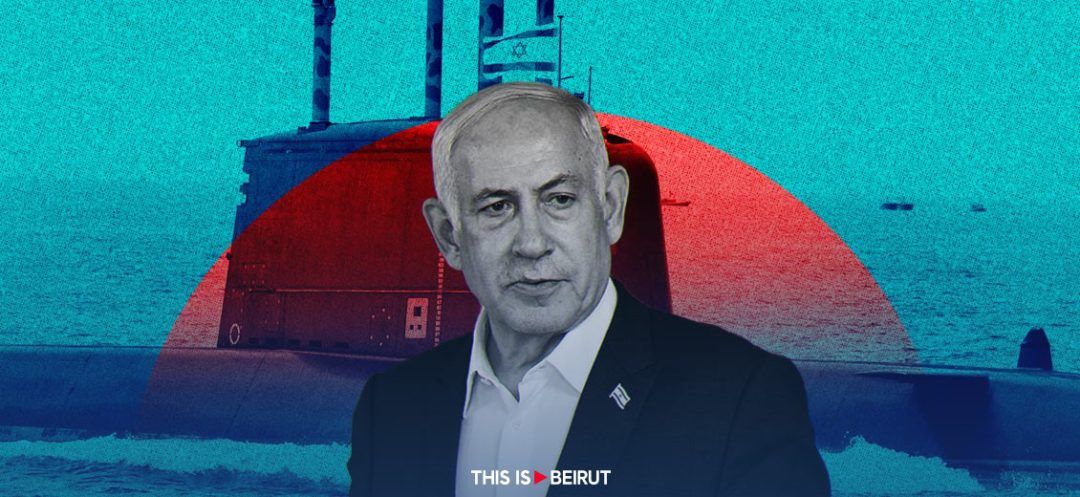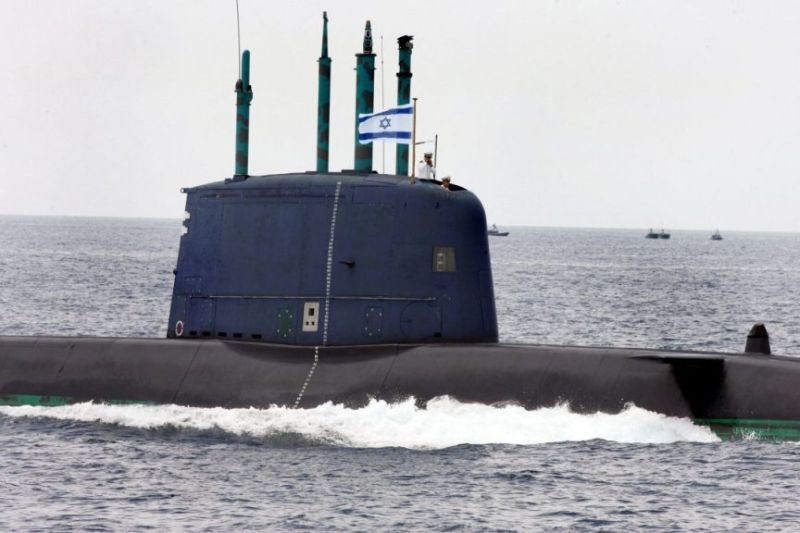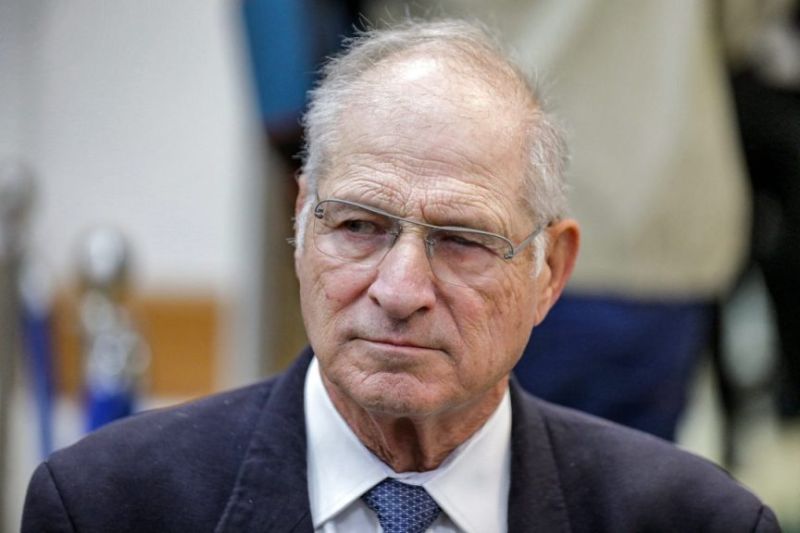- Home
- War in the Middle East
- Israel: The Submarine Scandal That Could Torpedo Netanyahu

An Israeli commission investigating suspicions of wrongdoing in the purchase of submarines and warships from Germany by the Israeli government issued a warning to Prime Minister Benjamin Netanyahu on Monday, according to information reported by Reuters.
This commission reportedly informed Netanyahu that, based on the evidence gathered so far, it might ultimately determine that he used his position as Prime Minister between 2009 and 2016 to greenlight these purchases without following proper procedures.
The "submarine scandal" in Israel, also known as "Case 3000," is a corruption scandal that erupted in 2016, involving high-ranking Israeli political and military officials. It highlighted allegations of corruption, conflicts of interest, and fraud.
Since the late 1950s, Israel has developed a strategic defense partnership with Germany. In the early 1990s, this cooperation was marked by the purchase by Tel Aviv of Dolphin-class submarines, manufactured by the German shipyard ThyssenKrupp.
 The Israeli submarine "Dolphin" sails in the Mediterranean near the coastal city of Tel Aviv during special naval maneuvers to mark the 60th anniversary of Israel's independence, May 5, 2008. The "Dolphin", a German-built submarine, is 56.4 m long and has a range of 4,500 nautical miles. It is armed with ten 21" multi-purpose tubes for torpedoes, mines, missiles and decoys. (GALI TIBBON / AFP)
The Israeli submarine "Dolphin" sails in the Mediterranean near the coastal city of Tel Aviv during special naval maneuvers to mark the 60th anniversary of Israel's independence, May 5, 2008. The "Dolphin", a German-built submarine, is 56.4 m long and has a range of 4,500 nautical miles. It is armed with ten 21" multi-purpose tubes for torpedoes, mines, missiles and decoys. (GALI TIBBON / AFP)
These submarines were intended to contribute to Israel's nuclear deterrence capability. A total of six units were purchased, with deliveries spanning from 1999 to 2017. However, in 2016, accusations emerged concerning bribes and illegal commissions paid to influence the decision-making process regarding the purchase of these submarines and other ships.
The investigation was triggered by information provided by a whistleblower, leading to a series of arrests and interrogations of high-ranking civilian and military officials. Among them was Miki Ganor, ThyssenKrupp's representative in Israel, who was at the center of the allegations. He was accused of paying bribes to various officials to secure the purchase of submarines and other warships.
David Shimron, Ganor's lawyer, was also prosecuted for using his influence to favor the deal, acting as a liaison agent for his client. Other figures, such as former Israeli Navy commander Eliezer Marom, were also involved.
David Shimron and Miki Ganor were arrested in July 2017. Ganor then signed an agreement with Israeli justice, agreeing to provide evidence in exchange for a reduced sentence.
The scandal had significant political repercussions. This was mainly because Shimron was none other than Netanyahu's personal lawyer, who had been Prime Minister since 2009. It was Netanyahu's office that led the negotiations around this contract, in a process that was criticized by Israeli political and military officials for its opacity.
 Israeli lawyer David Shimron attends a hearing on behalf of the Israeli Prime Minister (unseen) at the Rishon Lezion Magistrate's Court, January 23, 2023. (ABIR SULTAN / POOL / AFP)
Israeli lawyer David Shimron attends a hearing on behalf of the Israeli Prime Minister (unseen) at the Rishon Lezion Magistrate's Court, January 23, 2023. (ABIR SULTAN / POOL / AFP)
This point also led to political and judicial repercussions, as the Dolphin submarine scandal raised concerns about Israel's national security. Although Benjamin Netanyahu was not directly accused at the time, the case tarnished his image and that of his government, revealing that corruption was present even at the highest levels of the state.
The Prime Minister was nevertheless questioned by police for several hours as part of the case in 2018 but was treated as a witness, not a suspect. Calls were made for a more in-depth investigation into his potential role, especially because of his closeness to some of the accused.
In 2020, the Knesset, dominated by a coalition led by Netanyahu's Likud party, rejected a bill to create a commission of inquiry into the submarine corruption scandal. Two years later, this commission was finally set up – not without difficulty – under the coalition of Benny Gantz and Naftali Bennett. But it had never found elements that could endanger the current Prime Minister, at least until yesterday…
As a matter of fact, the warning could well precede a shift from witness to suspect status. In its statement, the commission explicitly states that Mr. Netanyahu, by "creating a parallel action channel" to the usual procedures for arms purchases, "endangered the security of the state and harmed the state's foreign relations and economic interests."
This comes as the Prime Minister is already the subject of three other investigations. The first, considered the most dangerous for him, is known as "Case 4000." It involves corruption allegations, where Mr. Netanyahu is suspected of offering concessions worth hundreds of millions of dollars to Shaul Elovitch, majority shareholder of Bezeq Telecommunications, in exchange for favorable coverage on his media outlet Walla.
Then come "Case 1000" and "Case 2000," involving influence peddling accusations. In the first, Netanyahu is accused of accepting gifts from wealthy businessmen in exchange for political favors. In the second, he allegedly struck a deal with Arnon Mozes, director of Yedioth Ahronoth, to secure favorable coverage in exchange for undermining a rival newspaper through new legislation.
The noose could therefore tighten more quickly than expected around someone whose longevity as Prime Minister of Israel is unmatched. But he remains almost untouchable as long as he stays in office.
[readmore url="https://thisisbeirut.com.lb/world/266022"]
Benjamin Netanyahu seems to understand this well: from U.S. President Joe Biden to his political opponent Yair Lapid, many accuse him of prolonging the war against Hamas, by refusing to conclude a hostage release and ceasefire agreement, solely to protect his own interests. This is despite growing domestic opposition to his policy.
In addition to avoiding the risk of losing his position in new elections, this allows him to divert attention from the corruption accusations against him. A political survival instinct demonstrating that the Israeli Prime Minister seems determined to sacrifice everything to remain in power.
This commission reportedly informed Netanyahu that, based on the evidence gathered so far, it might ultimately determine that he used his position as Prime Minister between 2009 and 2016 to greenlight these purchases without following proper procedures.
Context and Origin
The "submarine scandal" in Israel, also known as "Case 3000," is a corruption scandal that erupted in 2016, involving high-ranking Israeli political and military officials. It highlighted allegations of corruption, conflicts of interest, and fraud.
Since the late 1950s, Israel has developed a strategic defense partnership with Germany. In the early 1990s, this cooperation was marked by the purchase by Tel Aviv of Dolphin-class submarines, manufactured by the German shipyard ThyssenKrupp.
 The Israeli submarine "Dolphin" sails in the Mediterranean near the coastal city of Tel Aviv during special naval maneuvers to mark the 60th anniversary of Israel's independence, May 5, 2008. The "Dolphin", a German-built submarine, is 56.4 m long and has a range of 4,500 nautical miles. It is armed with ten 21" multi-purpose tubes for torpedoes, mines, missiles and decoys. (GALI TIBBON / AFP)
The Israeli submarine "Dolphin" sails in the Mediterranean near the coastal city of Tel Aviv during special naval maneuvers to mark the 60th anniversary of Israel's independence, May 5, 2008. The "Dolphin", a German-built submarine, is 56.4 m long and has a range of 4,500 nautical miles. It is armed with ten 21" multi-purpose tubes for torpedoes, mines, missiles and decoys. (GALI TIBBON / AFP)These submarines were intended to contribute to Israel's nuclear deterrence capability. A total of six units were purchased, with deliveries spanning from 1999 to 2017. However, in 2016, accusations emerged concerning bribes and illegal commissions paid to influence the decision-making process regarding the purchase of these submarines and other ships.
The investigation was triggered by information provided by a whistleblower, leading to a series of arrests and interrogations of high-ranking civilian and military officials. Among them was Miki Ganor, ThyssenKrupp's representative in Israel, who was at the center of the allegations. He was accused of paying bribes to various officials to secure the purchase of submarines and other warships.
David Shimron, Ganor's lawyer, was also prosecuted for using his influence to favor the deal, acting as a liaison agent for his client. Other figures, such as former Israeli Navy commander Eliezer Marom, were also involved.
Investigation and Developments
David Shimron and Miki Ganor were arrested in July 2017. Ganor then signed an agreement with Israeli justice, agreeing to provide evidence in exchange for a reduced sentence.
The scandal had significant political repercussions. This was mainly because Shimron was none other than Netanyahu's personal lawyer, who had been Prime Minister since 2009. It was Netanyahu's office that led the negotiations around this contract, in a process that was criticized by Israeli political and military officials for its opacity.
 Israeli lawyer David Shimron attends a hearing on behalf of the Israeli Prime Minister (unseen) at the Rishon Lezion Magistrate's Court, January 23, 2023. (ABIR SULTAN / POOL / AFP)
Israeli lawyer David Shimron attends a hearing on behalf of the Israeli Prime Minister (unseen) at the Rishon Lezion Magistrate's Court, January 23, 2023. (ABIR SULTAN / POOL / AFP)This point also led to political and judicial repercussions, as the Dolphin submarine scandal raised concerns about Israel's national security. Although Benjamin Netanyahu was not directly accused at the time, the case tarnished his image and that of his government, revealing that corruption was present even at the highest levels of the state.
The Prime Minister was nevertheless questioned by police for several hours as part of the case in 2018 but was treated as a witness, not a suspect. Calls were made for a more in-depth investigation into his potential role, especially because of his closeness to some of the accused.
In 2020, the Knesset, dominated by a coalition led by Netanyahu's Likud party, rejected a bill to create a commission of inquiry into the submarine corruption scandal. Two years later, this commission was finally set up – not without difficulty – under the coalition of Benny Gantz and Naftali Bennett. But it had never found elements that could endanger the current Prime Minister, at least until yesterday…
Three Other Investigations
As a matter of fact, the warning could well precede a shift from witness to suspect status. In its statement, the commission explicitly states that Mr. Netanyahu, by "creating a parallel action channel" to the usual procedures for arms purchases, "endangered the security of the state and harmed the state's foreign relations and economic interests."
This comes as the Prime Minister is already the subject of three other investigations. The first, considered the most dangerous for him, is known as "Case 4000." It involves corruption allegations, where Mr. Netanyahu is suspected of offering concessions worth hundreds of millions of dollars to Shaul Elovitch, majority shareholder of Bezeq Telecommunications, in exchange for favorable coverage on his media outlet Walla.
Then come "Case 1000" and "Case 2000," involving influence peddling accusations. In the first, Netanyahu is accused of accepting gifts from wealthy businessmen in exchange for political favors. In the second, he allegedly struck a deal with Arnon Mozes, director of Yedioth Ahronoth, to secure favorable coverage in exchange for undermining a rival newspaper through new legislation.
Netanyahu Cornered?
The noose could therefore tighten more quickly than expected around someone whose longevity as Prime Minister of Israel is unmatched. But he remains almost untouchable as long as he stays in office.
[readmore url="https://thisisbeirut.com.lb/world/266022"]
Benjamin Netanyahu seems to understand this well: from U.S. President Joe Biden to his political opponent Yair Lapid, many accuse him of prolonging the war against Hamas, by refusing to conclude a hostage release and ceasefire agreement, solely to protect his own interests. This is despite growing domestic opposition to his policy.
In addition to avoiding the risk of losing his position in new elections, this allows him to divert attention from the corruption accusations against him. A political survival instinct demonstrating that the Israeli Prime Minister seems determined to sacrifice everything to remain in power.
Read more




Comments